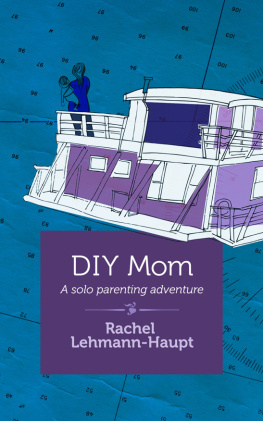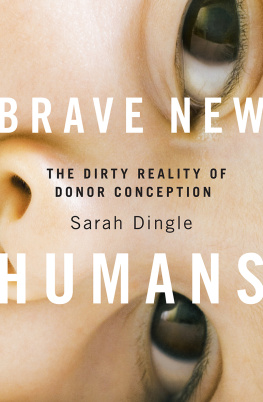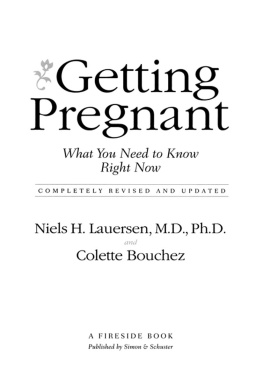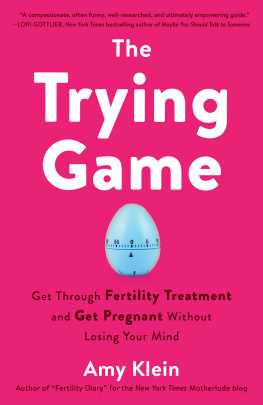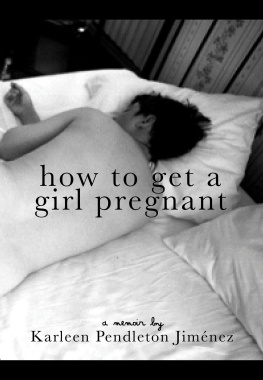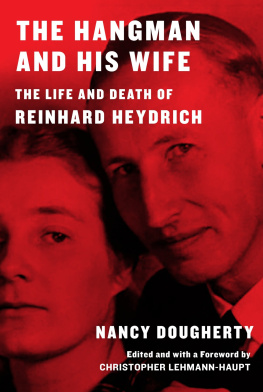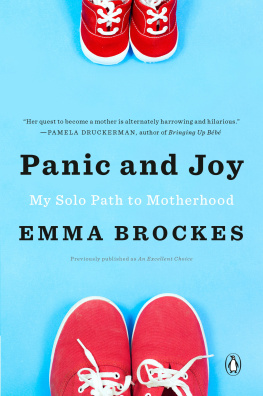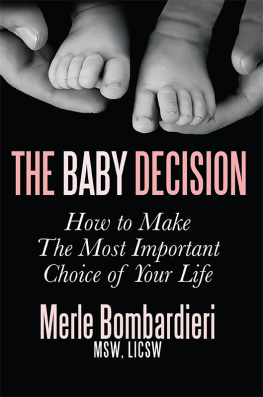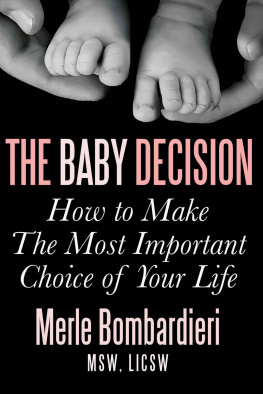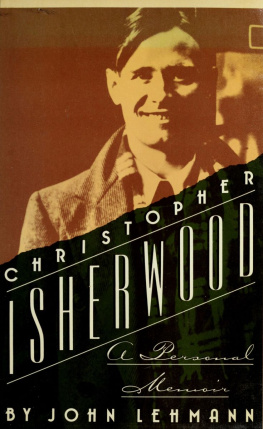Thanks for downloading a Shebook.
click here, or visit us online at shebooks.net.
All rights reserved. No part of this book may be reproduced, scanned, or distributed in any printed or electronic form without permission.
Before
On a cold night in January 2007, a few months after my 37th birthday, I came to a crossroads with Jacob, whom I had been dating for a year. We were sitting in the dimly lit living room of his New York City apartment on opposite ends of the couch when he told me that he wasnt sure whether he could spend the rest of his life with me.
I love you, he said. I wish I didnt.
It was the most confusing statement Id ever heard from a lover. He thought our relationship should feel more like a honeymoon. Instead he felt I was pushing him to decide whether or not to get married. He admitted that my desire to have children and my worry about my fertility felt like too much pressure. All through our relationship and two years before, I had been working on a series of articles that became a book proposal about why so many women were facing the edge of their fertility, planning their families after the age of 35, when doctors traditionally stamp pregnant womens charts advanced maternal age. Because I was so steeped in the research, I was worried about my fertility.
I burst into tears.
Ive had all this freedom to come this far in my career, and Ive finally found myself, I explained. And as a result, I found you. But now I dont have control over my biology!
Its natures cruel joke on women, he said, and then explained how he needed more time.
Fortuitously, I was offered a writing assignment in India, to review a new lodge in the central state of Madhya Pradesh. A few weeks later on a flight from New Delhi, I found myself sitting next to a chatty Indian businessman. He asked me if I wanted to meditate with himafter all, we were in India, or at least floating above it, so I accepted. With my eyes closed, I contemplated my odd position in the universe, suspended between locations, between the familiar and the strange, between deepened commitment to a man or to a new life alone. Just before we landed, my new friend offered to read my palm. I laid my hand on the plastic tray.
He studied it carefully. You will live until youre 80 and make lots of money. You will have two great loves.
Will I have children?
Its unclear, he said. I need a magnifying glass to read the smaller lines.
Why is family so important? I asked him when he looked up.
His face was bemused, as if the answer was obvious.
Its the traditional system, he said. Its the way we survive.
When I returned from India, Jacob and I broke up. He said he just didnt know if I was the one, and I didnt want to hang around waiting for him to figure it out. I was devastated but found solace by throwing myself into my work.
I wanted to understand how womenhow Igot in this predicament, ending up single in our late 30s with our biological clocks ticking louder every day. I also wanted to investigate the new choices many of us made to change the family system. I grew up in a traditional nuclear family, and my parents were still happily married; even so, it wasnt Father Knows Best because my mother, an early feminist, worked and presented her marriage as a partnership with my dad. I had automatically assumed I would form a similar kind of family, but it hadnt turned out that way.
When I entered college in 1988, my mom had said to me, Find your passion. Become yourself. It was a very different message from the one her mother had given her, which was, Dont let men know how smart you are or you will never find a husband! As the feminist movement blossomed, my mom half-listened. She found my dad, and he knew how smart she was; and she married him when she was 27 and they had two kids, my brother and me.
In my 20s, I had no interest whatsoever in getting married. I had interpreted my moms statement about finding my passion as a mandate to find and fine-tune my own interests and career rather than to burden myself too early with the compromises necessary for an enduring relationship and family. Instead of hunting for stability I spent the decade exploring eclectic interests and the more bohemian aspects of my personality. I studied for a semester of college in Nepal, climbing peaks in the Himalayas and living in an ashram with a sadhu, and then I traveled and danced into the sultry night on offbeat islands in Thailand. I moved across the U.S. to San Francisco and attended graduate school. Throughout it all, I surfed different relationships with men.
There were some unforgettable romantic experiencesthe sexy, hazel-eyed water polo player who taught me to play bar shuffleboard and once drove me around Minorca on the back of a little red scooter; the geeky magazine editor who was obsessed with retro airplane memorabilia and with whom I once drove all night to see camels race across the Nevada desert. There was the guy who drank red wine through a straw on our first date because he didnt want it to stain his teeth, and the quirky Mormon artist who was drawing the Grand Canal of Venice on a scroll. There was one guy who taught me that even if a man says hes going to call, he might not, and one who took me out twice before telling me that he was already living with someone. Each move I made, each professional adventure, and each relationship revealed a little more of what I wanted out of my life; each choice lead to new choices.
After my breakup with Jacob, I spent the next year researching and writing about the new opportunities technology and feminism had created for women when it came to marriage and motherhood. Over the years I had met women who were intentionally getting pregnant before getting engaged or walking down the aisle. Some were having children as single mothers by choice before even finding husbands (a term coined by Jane Mattes, a psychologist and single mom, who started an organization called Single Mothers by Choice in the 1980s as a way for women fitting the description to find support and community). I also met women who were conceiving children with eggs donated by younger women and who were freezing their own eggs to use themselves further down the road. When it comes to forming family, we now have many possible directions, very few rules, and virtually no map. This new world was cause for elation, I believed, but also terrifying.
As I wrote my own story, I wasnt sure where I would end up. I knew I wanted to have a child, but I just wasnt sure how that would happen. That year I discovered that I was only half liberated. Sure, I didnt go to college to get my Mrs. degree, like women of my mothers generation, or spend my 20s man hunting, but still, when I hit my 30s, I started to feel the ticking of not only my biological clock but even more urgently the social clock, which was telling me to find a husband. It seemed that a lot of people in my circles were coupling up and starting families, and I felt I should, too. Had I been in the same relationship with Jacob when I was 25, I probably wouldnt have pushed so hard to make it work, but the pressure I felt to form a family like my peers were doing virtually blinded me to the plain fact that my relationship with Jacob wasnt that great. Maybe this was because of what my meditating seatmate had told me: that family was the system of survival.

